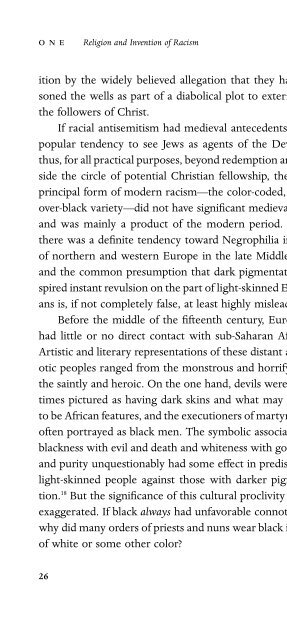Racism - A Short History - George M Fredrickson.pdf - WNLibrary
Racism - A Short History - George M Fredrickson.pdf - WNLibrary
Racism - A Short History - George M Fredrickson.pdf - WNLibrary
You also want an ePaper? Increase the reach of your titles
YUMPU automatically turns print PDFs into web optimized ePapers that Google loves.
TWO The Rise of Modern <strong>Racism</strong>(s)<br />
from the scattered references to Jews and blacks in the vast<br />
corpus of his writing, one can easily portray Voltaire as the<br />
first thoroughgoing modern racist. His direct contacts with<br />
blacks were extremely limited, if not nonexistent, but he<br />
may have been inclined toward antisemitism by unpleasant<br />
experiences with Jewish bankers. His main animus, however,<br />
was against Christianity, and he attacked Judaism<br />
mainly because of its links to the New Testament and the<br />
religion that it inspired. Rejecting the orthodox biblical account<br />
of human origins, he contended that the human<br />
races were distinct species that had developed separately<br />
and with permanently unequal capacities. His opinion of<br />
the black or African “species” can only be described as extremely<br />
dismissive and derogatory. His reading of the Old<br />
Testament and his observations of the contemporary descendants<br />
of the ancient Hebrews made him thoroughly<br />
unsympathetic, not only to Judaism, but also to Jews. In<br />
fact, he anticipated the secularized racial antisemitism of<br />
the late nineteenth century by implicitly attributing to Jews<br />
a permanent set of undesirable traits. But their defects, in<br />
his view, were the opposite of those that nineteenth-century<br />
antisemites would ascribe to them. For Voltaire Jews,<br />
past or present, symbolized religious fanaticism and intolerance<br />
as opposed to reason. (Romantic nationalists would<br />
later castigate them for their extreme rationalism.) His disbelief<br />
in the promises of the New Testament denied the<br />
power of conversion and gave Jews no role whatever in the<br />
drama of human redemption or progress. 22<br />
On another level, however, his general defense of religious<br />
toleration and civil liberties promised more to Jews<br />
than did the traditional Christian view that they were wit-<br />
62
















